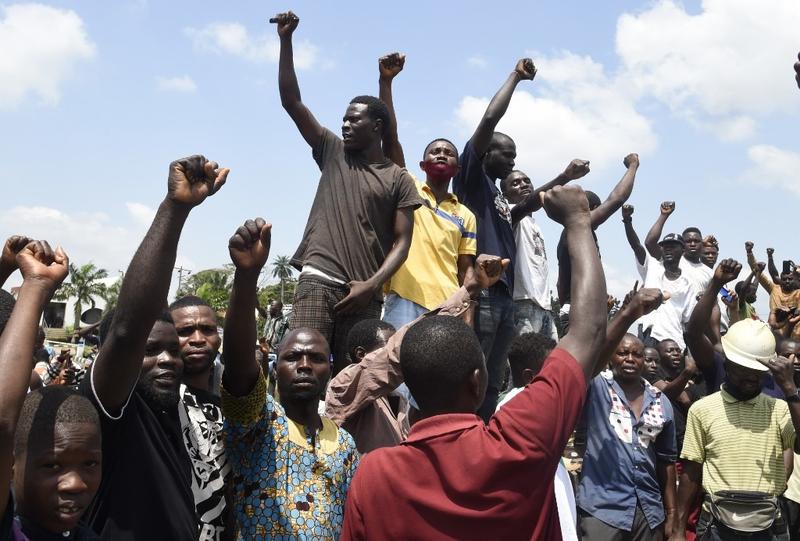 Protesters chant and sing solidarity songs as they barricade barricade the Lagos-Ibadan expressway to protest against police brutality and the killing of protesters by the military, at Magboro, Ogun State, on Oct 21, 2020. (PIUS UTOMI EKPEI / AFP)
Protesters chant and sing solidarity songs as they barricade barricade the Lagos-Ibadan expressway to protest against police brutality and the killing of protesters by the military, at Magboro, Ogun State, on Oct 21, 2020. (PIUS UTOMI EKPEI / AFP)
LAGOS - Gangs armed with knives and sticks blocked major roads in Lagos on Friday, with many angered by an appeal by Nigeria’s president for an end to demonstrations against police brutality that turned violent when protesters were shot.
The unrest is the worst street violence since Nigeria’s return to civilian rule in 1999 and is the most serious political crisis confronting President Muhammadu Buhari
A highway leading to the international airport was obstructed by blockades manned by groups of young men demanding cash from motorists. Buses whose drivers refused to pay were destroyed, a Reuters witness said.
To the east of the city, in the Ibeju area of Lekki, armed men chased away police and several police stations were burned to the ground.
ALSO READ: Nigerian president urges end to protests, warns state will act
Violence in Africa’s biggest city has escalated since Tuesday night, when a curfew was announced.
The unrest is the worst street violence since Nigeria’s return to civilian rule in 1999 and is the most serious political crisis confronting President Muhammadu Buhari, a former military leader who came to power at the ballot box in 2015 and is commander-in-chief of the armed forces.
The army has denied soldiers were at the site of the Lekki shooting, where people had gathered in defiance of the curfew.
Buhari, in a national address late on Thursday, urged youths to “discontinue the street protests and constructively engage government in finding solutions”.
It was his first public address since the shootings began. Although he lamented the loss of innocent lives, he did not directly refer to the Lekki incident that sparked international condemnation.
Many of those on the streets said Buhari’s speech had angered them because of his failure to address the Lekki incident.
Lagos authorities have struggled to enforce a round-the-clock curfew imposed as anger over the killings rose. One man on the road said military rule was better than what the country has now.
Reuters witnesses saw two military vans pass the airport but they ignored the armed men who were stopping, and in some cases attacking, cars and buses.
Gunshots were audible in Ikoyi, an affluent island neighbourhood, a resident told Reuters. Occupants of an apartment block were told to avoid windows and balconies.
READ MORE: Protesters return to Nigeria's streets after deadly clashes
Rights group the Feminist Coalition, which had been crowdfunding to support the protesters and pay the medical and legal fees of those injured or arrested, said on Thursday that it would stop taking donations.
“Our priority is always the welfare and safety of the Nigerian youth,” it said in a statement.
“Following the President’s address, we hereby encourage all young Nigerians to stay safe, stay home, and observe the mandated curfew in your state.”


